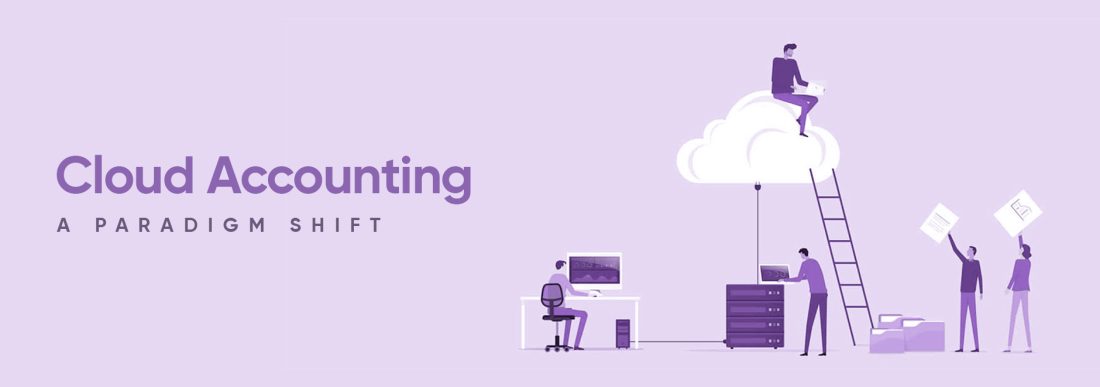A Paradigm Shift: Cloud Accounting a New Norm
Feb 08, 2023 | 15 Min Read


Jump to Sections
Stay updated
with our Blogs
We will keep you updated about our latest blogs
Share This Blog
What is Cloud Accounting and How Does It Work?
Cloud accounting refers to online accounting software, designed to assist in maintaining and managing your books. While traditional accounting software is installed on a company’s desktop or on its servers locked away in an office closet, cloud accounting software is hosted externally, on a remote server accessible through the internet (also known as the cloud). They are often delivered based on a Software as a Service (SaaS) model, that is, where the software is most often provided on a subscription basis.
Although cloud accounting systems operate similarly to on-premises accounting systems, the major deviation between the two systems is that the data is processed and returned to the user through the Internet.
What Are The Benefits Of Cloud Accounting Over Traditional Accounting Systems?
Although traditional accounting software has tremendous advantages over manual paper ledgers, they are nowhere near cloud accounting solutions in terms of the benefits offered. We highlight some of the major advantages of cloud accounting systems further here:
Accessibility: Traditional accounting systems can only be accessed from one location or desktop. Cloud accounting facilitates the use of mobile devices such as laptops, tablets, and smartphones, as data is accessible through the internet. These systems can provide on-hand, real-time analysis of business performance, which enables entrepreneurs to make well-informed and timely decisions.
Automation: Cloud accounting tools automate the accounting processes within the firm or the company’s finance and accounting department. Linking the company’s bank accounts to the system automatically records all transactions in the digital ledgers. Automatic bank reconciliations, payable and receivable reconciliations, and ledger postings, among others, result in immense time savings. Some accounting applications allow automatic payments to suppliers on predefined dates, as well as dispatching invoices to regular customers.
Accuracy: Manual inputting of data lends itself to human error and thus, data entered can be erroneous, especially as data is rarely organized after the input process or stage. Despite the accounting system and technologies employed, there is little to no room for accounting errors. The use of advanced technology such as artificial intelligence and machine learning (explained later on) further reduces the possibilities of error in cloud accounting systems, by limiting or reducing the requirements for humans to transpose data from paper to digital records or from one system/application to another.
Cost Reduction: Businesses that employ cloud software no longer require IT staff to manage the accounting system, as this is all outsourced and managed by the accounting and bookkeeping software service provider. Contrary to in-house systems, the upgradation and maintenance of software are done by the service provider with no additional cost incurred by the business. This allows the business to use the latest prevailing technologies in its internal processes, without the overhead and expertise to attain that on its own. This also allows the firm to only pay for those services that they require, while also minimizing the costs of servers and IT professionals. These cost savings can then be utilized in other business areas.
Control: Businesses now have more control over the information that can be accessed by employees. Limited access to the financials of the business can prevent the leakage of confidential information.
Collaboration: All data can only be viewed by authorized users in every major cloud-based accounting system. This increases goal collaboration as different department heads can view data related to their roles in real-time, allowing for an increase in teamwork, collaboration, and coordination.
Data Protection: Traditional accounting software requires data to be stored on hard drives that are free from viruses. A major drawback of physical storage is the occurrence of natural disasters, fires, and theft which may result in an irrecoverable loss of vital historical data. Cloud accounting and bookkeeping service providers offer the most extensive and up-to-date security protocols, with regular backups. Also, data is stored in multiple locations to prevent any loss of data. Sensitive information can now be accessed through the cloud, without having to send it to the concerned people through emails or other virus-prone or security-breach-prone channels.
Implementation: Businesses no longer require expensive infrastructure and competent staff to ensure that the software is running smoothly. By outsourcing accounting and bookkeeping services, startups can begin their accounting process from the very first day.
Scalability: As businesses continue to flourish, the procurement of additional hardware such as servers and therefore office space, is not required, as service space can simply be increased on the cloud. Businesses often only pay for the services and storage space they require.
When and Who Should Adapt to Cloud Accounting
The benefits of cloud accounting make it necessary for many businesses, especially startups, to adopt cloud accounting software. The lower upfront, as well as operational costs, make it attractive for entry-level firms to employ these services right from the get-go. This allows for the error and hassle-free accounting of transactions, resulting in lower tax and compliance-related issues. Moreover, the use of a cloud accounting platform allows for convenient tax filing, as all accounting records can be converted into tax return templates more efficiently than compared to prior technologies.
Furthermore, the constant requirement of having the company’s financial status on hand coupled with the work-from-home effects of the Covid-19 pandemic, has led to businesses transitioning into a paperless office, as the cloud services offer real-time snapshots of the firm’s financial health and the ability for the organization to operate remotely, in a dispersed fashion while still maintaining accurate, up-to-date accounting records. Often, the tremendous costs associated with manual accounting systems and the complexity of upgrading, maintaining, and optimizing this in-house system hinder the growth of many enterprises. This is because firms fail to utilize resources in more productive areas and understand what alternatives exist for their particular situation and needs.
Following the Covid-19 pandemic, the demand for remote working has significantly increased. It has become essential for all businesses to be prepared for COVID-19-like situations by increasing their flexibility and employing the most useful and appropriate technologies for the business. The benefits of these systems are not limited to startups and other small, early enterprises but can also be reaped by companies of all sizes.
Cloud Accounting Software Options
QuickBooks: QuickBooks is one of the most commonly used accounting software that allows entrepreneurs to run their businesses on the go. It is mainly targeted toward small and medium enterprises (SMEs) and is packed with many essential resources. With QuickBooks, entrepreneurs can track their financial performance at any point in time and location. The constant release of regular updates and security features ensures that data is always secure. Some of the features offered by QuickBooks are electronic payment functions, online banking and reconciliation, user authorization and restricted access, availability of templates for invoices, spreadsheets, business plans, and more.
Xero: Xero is a cloud-based accounting software mainly targeting small businesses. It provides the typical bookkeeping functions, along with the ability to link the company’s bank accounts for real-time analysis of accounts. Like QuickBooks, it also provides a financial snapshot of the current business position, via the formation of a dashboard. Xero offers several features such as calculation of sales tax, analysis of future cash flows, management of working capital, easy file storage, and so on, at a relatively cheaper price than competitors.
Other notable software options include and are not limited to Zoho Books, FreshBooks, and Sage, among others. Each of the mentioned software boasts significant benefits for businesses as compared with manual systems or in-house accounting software applications managed on the company’s internal I.T. networks.
Want to learn about the next steps for growing your business ?
Leveraging The Technology Ecosystem
Due to the recent advancements in technology, businesses are now able to integrate and leverage the technology ecosystem via the use of Artificial Intelligence (AI), Machine Learning (ML), and Blockchain.
The use of AI and ML, the latter being a subset of AI, ensures enhanced efficiencies through the reduction in time consumed and input errors. It allows for the automation of daily operations, among other functions. For example, software integrated with ML functions may instantly review large datasets, identify trends and patterns, as well as highlight potential errors in the dataset. The frequent use of ML algorithms is likely to further increase operating efficiencies as the algorithm continues to adjust and improve with every use, over time. They may also be programmed to undertake independent decisions, such as stock trading calls at a brokerage firm, for example.
This allows the timely reporting of errors or prevailing trends in the business and overall industry. Hence, AI may enable enhancements in the forecasting process of financial statement items, and the business in real-time, averting potential disruptive events before they occur.
Blockchain: In layman’s terms, Blockchain is a distributed and decentralized digital ledger used for the recording of asset ownership and their transfers. The use of Blockchain reduces the frequency of errors (via extensive and swift verifications) and embezzlement, as transactions, once posted, are unable to be altered. This results in a transparent chain of receivables and payables for the business, as well as promptly detailing the whole supply chain of products from suppliers to clients. Moreover, the integrated use of AI with Blockchain may enhance the audit trail of the firm through the automated verification of all transactions.
What is Business Intelligence and how can it be used?
Challenges of Cloud Accounting and their Solutions
Although the use of cloud accounting presents various benefits over manual-based or in-house accounting solutions, it also has its own challenges. In the coming pointers, we discuss the challenges of cloud accounting as well as their solutions.
Data migration: Transferring data from the current accounting system to the cloud is both hassle-free and time-consuming. Concerns may also arise from the loss of data, and security breaches about the leakage of confidential information, while also denting the company’s budget.
A potential solution to this predicament is phasing out the use of the local accounting system (non-cloud). This will ensure that the implementation of the cloud accounting system is given ample time to be tested. Also, companies should carefully formulate a budget, in terms of cost and time frame for the implementation. To smoothen the data transfer process, the company may also enlist the assistance of data migration specialists.
Potential lapse of security: As the transfer of data may be challenging, the possibility of a security lapse may also be increased. The company must ensure present security postures are embedded in the new cloud system. Therefore, companies should not only ensure that the accounting and bookkeeping services provider is highly reliable via third-party certifications, credentialization, and professional-body association, but should also closely monitor the data migration process as well. Also, the business should ensure that only those employees of a certain grade or position have access to information related to their role, with proper procedures and policies in place about the access of data.
Possible data loss: Due to the heterogeneity of software, the chances of losing data unfortunately also arise. This may be due to the lack of compatibility while importing/exporting data. Hence, the time-consuming need for having to input all the data once again into the new software may be required. Businesses should therefore thoroughly backup all data before the migration, to thwart and identify any loss of data.
Vendor lock-in: The inability to switch accounting software vendors is not uncommon. This is due to the use of unique and proprietary software, which makes the transfer process impractical and highly costly, in terms of finance and time. The lack of service quality as the customer is locked in and change of product specifications may in turn result in higher software costs than initially budgeted, for the company.
Lack of understanding with regards to cloud bundles: It is vital for the management to fully understand the requirements of the firm while choosing the optimal cloud accounting service and bundle, as no bundle is the same as any other. In-depth studies about billing, network infrastructure, and overall cost-benefit analysis, will ensure the company opts for the package that best fits the firm’s needs.
Effective inter-organizational communication and planning: The change in accounting software to cloud accounting demands effective communication between all departments and may result in the incurrence of additional costs related to employee training. This will ensure a smooth and relatively effortless transition to the new system. Moreover, a proper vision and strategy are needed to implement the migration in the best possible manner as much like anything else, having clear expectations and goals from the outset will only assist in managing change.
How Accountimize Can Help You Get Started
The challenges of migrating to the cloud and successfully reaping all its advantages are better left to be handled by professionals. With Accountimize, businesses no longer need to worry about overcoming the challenges of cloud accounting, as we assist in data migration and provide a secure environment for the business’s financial information. We are pro advisors of QuickBooks and a certified advisor of Xero, allowing our clients to experience the highest quality cloud-based accounting and bookkeeping services available.
So, book an engagement call with us so that we may guide you toward greatness.
Book a Discovery call


Stay updated
with our Blogs
We will keep you updated about our latest blogs



